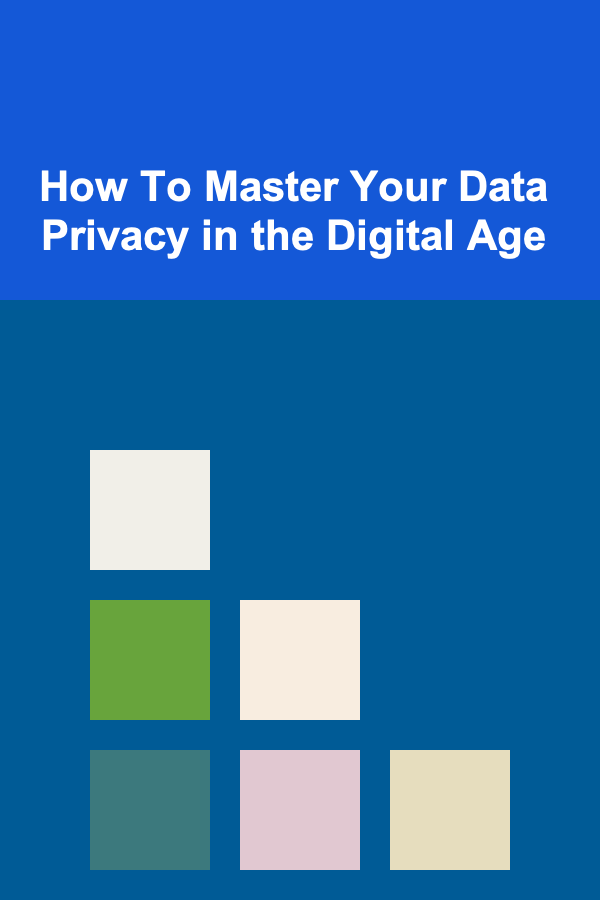
How To Master Your Data Privacy in the Digital Age
ebook include PDF & Audio bundle (Micro Guide)
$12.99$6.99
Limited Time Offer! Order within the next:

In the ever-evolving digital landscape, data privacy has become one of the most crucial aspects of our online lives. With every interaction online, we leave behind a trail of data that can be tracked, analyzed, and even exploited. The digital age has brought unprecedented convenience, but it has also introduced significant risks to our personal information. The question now is not whether data privacy matters, but how we can effectively protect ourselves in a world where everything from shopping habits to personal preferences is being monitored.
Mastering your data privacy requires awareness, proactive measures, and a commitment to safeguarding your digital footprint. In this article, we will explore the concept of data privacy, the current challenges, and practical steps that you can take to protect your data in today's hyper-connected world.
Understanding Data Privacy
Data privacy, also known as information privacy, refers to the proper handling, processing, storage, and dissemination of personal information. In simple terms, it's the right to have control over who can access and use your personal data. As individuals, we generate vast amounts of data daily, often without realizing the scope or potential consequences of sharing it. From social media profiles to online shopping habits, our digital identity is being shaped and stored in ways that we cannot always control.
At its core, data privacy is about protecting your identity, your preferences, and your digital activities from misuse, unauthorized access, or exploitation. But the challenge lies in how to exercise this protection in a digital environment that constantly changes and evolves. Privacy, in the digital age, is not simply about hiding information; it's about taking control of it.
The Importance of Data Privacy
The growing significance of data privacy is driven by several factors, including the rise of cybercrime, government surveillance, and the commercialization of personal data.
1. Cybersecurity Threats
Cybercrime is one of the most pressing concerns in the digital era. Hackers, cybercriminals, and malicious entities continuously look for ways to steal sensitive information like credit card details, passwords, and Social Security numbers. When this information falls into the wrong hands, it can lead to financial loss, identity theft, or even blackmail. Without robust data privacy practices, individuals and organizations become prime targets for such attacks.
2. Surveillance
Governments and corporations are increasingly collecting vast amounts of data on individuals. While this data collection can be for legitimate purposes like improving services or national security, it often raises concerns about privacy violations and the potential misuse of information. In many cases, individuals may not even be aware of the extent to which their data is being tracked or stored.
3. Exploitation by Corporations
In today's digital economy, personal data is often treated as a commodity. Companies collect data to refine their marketing strategies, improve customer experiences, or even sell it to third parties for profit. While some of these practices may seem harmless or even beneficial, they can also infringe upon your privacy, especially when data is shared without your explicit consent.
4. Personal Control
At its essence, data privacy gives individuals control over their personal information. Whether it's deciding what to share on social media, which apps to grant access to your location, or how to handle personal data in online transactions, your ability to maintain control over your information is vital for preserving your autonomy and security.
Common Data Privacy Threats
Before we delve into how to protect your data, it's important to understand the main threats that put your privacy at risk in the digital age.
1. Phishing and Social Engineering
Phishing is one of the most common and deceptive tactics used by cybercriminals. It involves tricking individuals into revealing sensitive information, such as passwords or credit card numbers, by posing as a trustworthy entity. Phishing attacks can occur through emails, social media messages, or fake websites that look legitimate.
2. Data Breaches
Data breaches occur when hackers access and leak personal information from companies, organizations, or online platforms. These breaches can expose a large number of individuals to the risk of identity theft, financial fraud, or other forms of exploitation.
3. Tracking and Surveillance
Many websites and apps use cookies or other tracking technologies to monitor your online behavior. While these tools are often used to improve user experience or personalize ads, they also collect detailed data about your browsing habits, location, and preferences. Over time, this data can build a detailed profile of you, which can be sold or used for targeted advertising.
4. Malware and Ransomware
Malware is malicious software designed to harm your computer or steal your personal data. Ransomware, a type of malware, can lock your files and demand a ransom in exchange for unlocking them. Both of these threats compromise your digital privacy and can lead to significant financial loss or data exposure.
5. Unsecured Wi-Fi Networks
Public Wi-Fi networks, such as those in coffee shops or airports, often lack sufficient security measures. When you connect to these networks, your data could be intercepted by hackers, leading to potential theft of sensitive information like passwords or banking details.
Practical Steps to Master Your Data Privacy
Now that we've covered the threats, let's explore how you can take control of your data privacy in the digital age. These practical steps are designed to help you reduce your exposure to risks and protect your personal information from exploitation.
1. Use Strong and Unique Passwords
One of the simplest yet most effective ways to protect your digital privacy is by using strong and unique passwords for each of your online accounts. A strong password typically contains a mix of upper and lower case letters, numbers, and special characters. Avoid using easily guessable information, such as your name or birthdate.
Consider using a password manager to securely store and manage your passwords. This tool will generate strong passwords for you and ensure that you don't have to remember them all.
2. Enable Two-Factor Authentication (2FA)
Two-factor authentication (2FA) adds an extra layer of security to your accounts by requiring two forms of identification: your password and a second verification method, such as a code sent to your phone. By enabling 2FA, even if a hacker manages to obtain your password, they will still be unable to access your account without the second factor.
3. Be Cautious with Personal Information
Think twice before sharing personal information online. Whether it's your address, phone number, or personal preferences, sharing too much can expose you to identity theft or unwanted tracking. Review privacy settings on social media platforms and limit the amount of personal information you share.
4. Use Encrypted Communications
Whenever possible, use encrypted communication tools to protect your messages from eavesdropping. End-to-end encryption ensures that only you and the intended recipient can read your messages. Popular messaging apps like Signal and WhatsApp offer encryption by default, ensuring that your private conversations remain confidential.
5. Monitor and Manage Your Digital Footprint
Regularly audit your online accounts and digital footprint. This includes reviewing the permissions you've granted to apps and websites, checking the privacy settings on social media platforms, and deleting accounts you no longer use. By actively managing your digital presence, you can reduce the risk of personal data exposure.
6. Use Virtual Private Networks (VPNs)
A Virtual Private Network (VPN) allows you to create a secure connection to the internet by encrypting your data and hiding your IP address. This prevents hackers, advertisers, and even your internet service provider from tracking your online activities. Using a VPN is especially important when connecting to public Wi-Fi networks, as it adds an extra layer of protection.
7. Be Aware of Phishing Scams
Always verify the legitimacy of emails, messages, or websites before clicking on links or providing personal information. Phishing scams often use urgent language or fake threats to trick you into sharing sensitive details. Be cautious when receiving unsolicited communications, especially if they ask for login credentials or financial information.
8. Limit the Use of Tracking Tools
Many websites use cookies to track your browsing behavior. While these tools can enhance your online experience, they also collect data that can be sold to third parties or used for targeted advertising. Consider using browser extensions that block or manage cookies, such as Ghostery or Privacy Badger.
9. Secure Your Devices
Ensure that all your devices, including smartphones, laptops, and tablets, are protected by strong passwords and encryption. Many modern operating systems offer built-in encryption tools that make it harder for anyone to access your data in case of theft or loss. Always update your software regularly to protect against security vulnerabilities.
10. Understand Privacy Policies
Before using any online service or platform, take the time to read and understand its privacy policy. This document outlines how your data will be collected, stored, and used. Look for services that prioritize user privacy and offer clear options for controlling your data, such as data deletion or opt-out features for marketing purposes.
The Future of Data Privacy
As technology continues to advance, so too will the threats to our data privacy. The rise of artificial intelligence, machine learning, and biometric data collection presents new challenges in protecting our personal information. At the same time, we can expect more regulations and tools designed to give individuals greater control over their data.
In the future, privacy-conscious individuals may need to be even more vigilant about their online activities. Staying informed, being proactive, and advocating for stronger data privacy protections will be crucial to ensuring that our personal information remains safe in the digital age.
Conclusion
Mastering your data privacy in the digital age is not an option but a necessity. With the increasing threats of cybercrime, surveillance, and data exploitation, protecting your personal information has never been more important. By adopting the strategies outlined in this article, you can take control of your digital identity, reduce the risks, and protect your privacy. Ultimately, the key to mastering data privacy lies in awareness, vigilance, and proactive action. Your data is your most valuable asset---treat it accordingly.

How To Approach Recruiters on LinkedIn
Read More
How to Use Staging to Enhance Your Home's Architectural Features
Read More
The Marketing Director's Playbook: Innovative Approaches to Brand Growth
Read More
How to Understand the Role of Live Sound Engineers
Read More
Selecting the Best Tubeless Tire Repair Kit: A Comprehensive Guide
Read More
10 Tips for Forecasting Demand as a Retail Buyer
Read MoreOther Products

How To Approach Recruiters on LinkedIn
Read More
How to Use Staging to Enhance Your Home's Architectural Features
Read More
The Marketing Director's Playbook: Innovative Approaches to Brand Growth
Read More
How to Understand the Role of Live Sound Engineers
Read More
Selecting the Best Tubeless Tire Repair Kit: A Comprehensive Guide
Read More